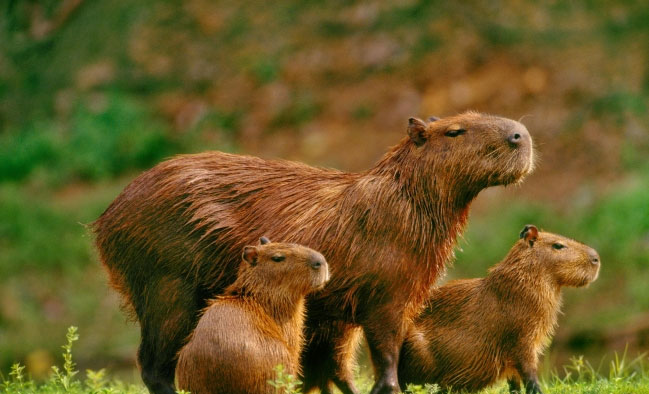Explaining why water hamsters don't get cancer
According to bioRxiv.org, an international scientific team consisting of Colombian, Swedish and American researchers solved the DNA sequence of Capybara guinea pig, the world's largest rodent .
During the study, they discovered a unique way to reduce the risk of tumor growth in the guinea-pig's body.

Water guinea pigs also have a special method of preventing cancer - (Photo: Carlos Eduardo Livino).
Water hamster Capybara (Hydrochoerus hydrochaeris) is widespread in South America. They often live around ponds, swim and dive well when looking for ways to escape terrestrial predators. The ancestors of guinea-pigs originated in Africa about 80 million years ago and came to South America 40 million years later. The body of the guinea pig is 1.35m long, 60cm high and the weight can exceed 60kg.
As rodents, they are huge in size but also have the Kerodon rupestris subspecies weighing no more than 1kg. Normally, the small size of rodent bodies is explained by survival strategies: it is easier to hide when evading enemies and not all predators like to chase children. small bait.
However, according to evolutionary biologist V.Louise Roth of Duke University (USA), when the ancestors of water guinea pigs appeared in South America, there were almost no predators in this area, and this had They can allow rodents to increase their body size. But an increase in body size raises a new task for water guinea pigs. The more cells in the body, the greater the risk that one of them will degenerate and develop tumors.
Accordingly, the risk of cancer in large animals must be higher. But, this does not happen in nature. Neither elephants nor whales have more cancer than small animals. Scientists saw this phenomenon in the 1970s and were called Pet paradox by the name of British doctor Richard Peto. Only in recent years have scientists understood exactly why different large animals achieve that effect. For example, elephants have a very reliable mechanism to repair damaged DNA.
In the new study, scientists found that water guinea pigs also have a special method of preventing cancer.The genes that determine the function of the immune system in water hamsters allow for better detection and destruction of cells that divide too quickly . Thus, immune cells in guinea-pigs can inhibit newly formed tumors. According to the authors of the study, this was not observed in other animals.
- Study against the harmful effects of dust and smoke from hamsters
- The secret life of the hamsters
- Video: Why can hamsters stuff so much food into their mouths?
- Using water pipes with copper is easy to cause cancer
- Millions of Bangladeshis have to use contaminated water daily
- Diagnosis of early stage cancer by ... water molecules
- Drinking carbonated water increases the risk of cancer
- Cancer should eat?
- Why is Australia the country with the highest cancer rate in the world while Vietnam ranks 100th?
- Why is hot water freezing faster than cold water?
- Explaining the cause of eating leftovers in the refrigerator can cause cancer
- Drinking water this way, cancer, diabetes will never reach you
 Animal 'suffering' after hibernation
Animal 'suffering' after hibernation Why do goats climb well?
Why do goats climb well? Scientists were surprised to see chimpanzees eating turtles
Scientists were surprised to see chimpanzees eating turtles Giant catfish died deadly due to drought in Thailand
Giant catfish died deadly due to drought in Thailand